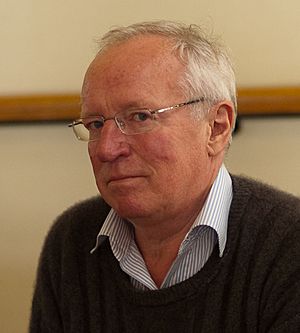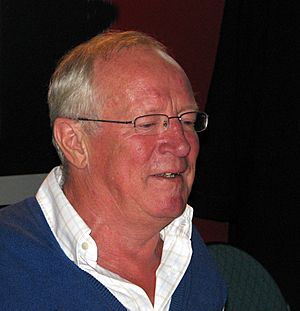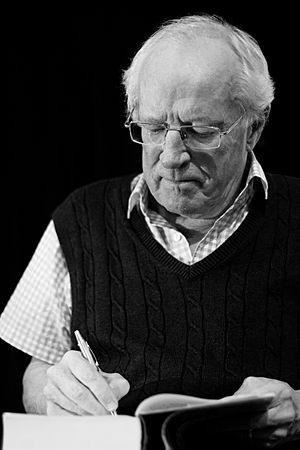Robert Fisk facts for kids
Quick facts for kids
Robert Fisk
|
|
|---|---|

Robert Fisk at Al Jazeera Forum 2010
|
|
| Born | 12 July 1946 Maidstone, Kent, England
|
| Died | 30 October 2020 (aged 74) Dublin, Ireland
|
| Citizenship |
|
| Education |
|
| Occupation | Middle East correspondent for The Independent |
|
Notable credit(s)
|
|
| Spouse(s) |
|
Robert Fisk (born 12 July 1946 – died 30 October 2020) was a famous English writer and journalist. He was known for his strong opinions. He often criticized how the United States handled things in the Middle East. He also spoke out about how the Israeli government treated Palestinians. Some people really admired his views, while others disagreed with them.
As an international correspondent, he reported from many conflict zones. He covered civil wars in Lebanon, Algeria, and Syria. He also reported on the Iran–Iraq War, and conflicts in Bosnia and Kosovo. He was there for the Soviet–Afghan War, the Iranian Revolution, and the Gulf War. He also covered the U.S. invasion and the time after it.
Robert Fisk could speak Arabic. He was one of the few Western journalists who got to interview Osama bin Laden. He spoke with him three times between 1993 and 1997.
He started his career at local newspapers like the Newcastle Chronicle. Then he worked for The Times as a correspondent in Northern Ireland and the Middle East. From 1989, he worked for The Independent. Fisk won many awards for his journalism. He was named "Foreign Reporter of the Year" seven times at the British Press Awards.
Some of his well-known books include Pity the Nation: Lebanon at War (1990) and The Great War for Civilisation: The Conquest of the Middle East (2005).
Contents
Who Was Robert Fisk?
Early Life and Education
Robert Fisk was born in Maidstone, Kent, England, on 12 July 1946. He was the only child of William and Peggy Fisk. His father, William, fought in World War I. Robert said his father once refused to follow an order to harm another soldier. This act deeply impressed Robert.
Fisk went to Lancaster University where he studied Latin and Linguistics. He later earned a PhD in political science from Trinity College Dublin. His studies focused on Ireland's neutrality during World War II.
His Career as a Journalist
Robert Fisk first worked for the Sunday Express. Later, he moved to The Times. From 1972 to 1975, he reported from Belfast during a difficult time called the Troubles. He then became the Middle East correspondent for The Times in 1976. He reported on the Iranian Revolution in 1979.
In 1989, Fisk joined The Independent newspaper. He became one of Britain's most famous foreign correspondents. The Economist called him one of the most important reporters in the Middle East since World War II.
Reporting on Wars
Fisk lived in Beirut, Lebanon, starting in 1976. He stayed there throughout the Lebanese Civil War. He was one of the first Western journalists to report on the terrible Sabra and Shatila massacre in Lebanon. His book, Pity the Nation, is about the Lebanese conflict.
He also reported on many other wars and conflicts. These included the Soviet–Afghan War, the Iran–Iraq War, and the Arab–Israeli conflict. He covered the Gulf War, the Kosovo War, and the Syrian Civil War. During the Iran–Iraq War, he lost some of his hearing because he was too close to loud artillery.
After the United States and its allies went into Afghanistan in 2001, Fisk reported from Pakistan. There, he was attacked by a group of Afghan refugees. He wrote about this experience, saying that their anger came from the suffering they had endured. He believed their actions were a result of the wars and bombings they had faced.
During the 2003 invasion of Iraq, Fisk was in Baghdad. He sent many reports as an eyewitness. He criticized other journalists who reported from their hotel rooms without seeing events firsthand. He also questioned the reasons given for the violence in Iraq after the invasion.
Interviewing Osama bin Laden
Fisk interviewed Osama bin Laden three times. These interviews were published in The Independent in 1993, 1996, and 1997. In his first interview, Fisk described bin Laden as looking like a "mountain warrior."
During one interview, bin Laden tried to convince Fisk to become a Muslim. Fisk replied that he was a journalist whose job was to tell the truth. Bin Laden then said, "If you tell the truth, that means you are a good Muslim."
Fisk strongly condemned the September 11 attacks in 2001. He called them a "hideous crime against humanity." However, he also criticized the George W. Bush administration's response. He argued that there should be an honest discussion about U.S. policy in the Middle East.
In 2007, Fisk shared some personal doubts about the official story of the 9/11 attacks. He wrote that he was "increasingly troubled at the inconsistencies in the official narrative." He said he was talking about "scientific issues" and not "crazed 'research'."
Reporting on the Syrian Civil War
In April 2018, Fisk reported from Douma, Syria, about a suspected chemical attack. He spoke to a Syrian doctor who thought the victims' breathing problems were from dust and lack of oxygen, not gas. Other people he spoke to also doubted a gas attack had happened.
Fisk's reporting was criticized because he relied on contacts provided by the Syrian government. Other journalists on the same trip interviewed people who said they had inhaled toxic gas.
Media Appearances and Documentaries
Robert Fisk was interviewed for the radio show Desert Island Discs in 2006. He also appeared in several documentary films.
He was featured in the 2016 film notes to eternity. This film explored the lives and work of journalists and thinkers related to the Israel–Palestine conflict.
Fisk was also the subject of the 2019 documentary film This Is Not a Movie. The film looked at his career and his ideas about war. It asked deep questions about why wars seem to be so common.
Personal Life
Robert Fisk married American journalist Lara Marlowe in 1994. They later divorced in 2006. At the time of his death, he was married to Nelofer Pazira, an Afghan-Canadian journalist and human rights activist.
Fisk once reflected on his life as a war correspondent. He wondered if he had missed out on a more peaceful life. However, he also acknowledged that he had the unique chance to see things no one else had.
His Passing
Robert Fisk died on 30 October 2020, at the age of 74. He passed away in Dublin, Ireland, after a suspected stroke. His funeral was private due to the COVID-19 pandemic.
Many important people shared their condolences. The President of Ireland, Michael D. Higgins, said that journalism had lost "one of its finest commentators." The Taoiseach (Irish Prime Minister), Micheál Martin, called him "fearless and independent" in his reporting.
Awards and Honors
Robert Fisk received many awards for his journalism. He won the British Press Awards' "International Journalist of the Year" seven times. He also won "Reporter of the Year" twice. He received Amnesty International UK Media Awards multiple times for his reports.
Some of his other awards and honors include:
- 1984 Lancaster University honorary degree
- 1991 Jacob's Award for his coverage of the Gulf War
- 1999 Orwell Prize for journalism
- 2002 Martha Gellhorn Prize for Journalism
- 2006 Lannan Cultural Freedom Prize
- Many honorary doctorates from universities around the world.
His Books and Films
Books by Robert Fisk
- The Point of No Return: The Strike Which Broke the British in Ulster (1975)
- In Time of War: Ireland, Ulster and the Price of Neutrality, 1939–1945 (1983)
- Pity the Nation: Lebanon at War (1990)
- The Great War for Civilisation: The Conquest of the Middle East (2005)
- The Age of the Warrior: Selected Writings (2008)
- Robert Fisk on Algeria: Why Algeria's Tragedy Matters (2013)
Video Documentary Series
Fisk created a three-part TV series called From Beirut To Bosnia in 1993. In this series, he tried to understand why more and more Muslims felt anger towards the West. Fisk said that the Discovery Channel did not show repeats of the series after some groups complained.
See also
 In Spanish: Robert Fisk para niños
In Spanish: Robert Fisk para niños
 | Sharif Bey |
 | Hale Woodruff |
 | Richmond Barthé |
 | Purvis Young |



